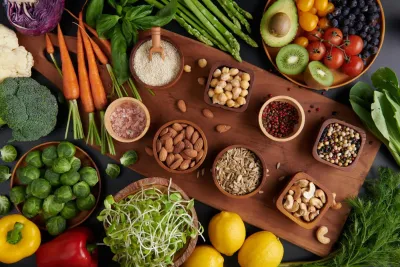Boost Your Testosterone Naturally with These Popular Foods
Chilipad Editorial Team • Feb 10, 2025

Key Takeaways
Testosterone levels are influenced by nutrition, sleep, stress, and daily habits, with certain foods playing a direct role in hormone production and balance.
- Foods like tuna, egg yolks, and leafy greens support natural testosterone production by supplying key nutrients involved in hormone signaling.
- Zinc rich foods such as oysters, beef, and pumpkin seeds help maintain healthy testosterone levels and support overall hormone balance.
- Healthy fats from sources like avocados, olive oil, and nuts are necessary for testosterone synthesis and metabolic function.
- Nutrition alone is not enough. Consistent sleep, regular exercise, and stress control are equally important for supporting healthy testosterone levels.
Testosterone levels affect many functions in the body, including bone strength, sleep cycles, and mindset. While having too much or too little testosterone can cause problems, naturally occurring high testosterone levels are not common in men. [1]
Connections have been found between low testosterone and increased body fat, as well as between healthy sleep and weight management. Getting quality sleep is important not only for weight management but also for maintaining healthy blood sugar levels and lowering the risk of metabolic diseases like diabetes and obesity.
Therefore, since we know that healthy levels are essential for weight loss and quality sleep, we wanted to research foods that can help increase lean muscle mass, naturally boost testosterone production, and improve sleep.
Decrease of Insulin Study: Studies have shown that just one night of sleep deprivation can decrease insulin sensitivity by as much as 33%. [2]
Men's testosterone levels can fall naturally with age. But lifestyle choices, conditions of health, and other factors that can also impact the amount of testosterone in the body. 1 to 2 percent per year. [3]
However, this can occur based on lifestyle choices, medical conditions, and other factors that can impact the amount of this hormone in the body.
##What is Low Testosterone? Feeling sluggish? Motivation dwindling? Noticing a decrease in muscle mass? These could be signs of low testosterone, a condition that affects many men.
Think of testosterone as the fuel that powers your masculinity. It's the hormone responsible for developing male characteristics like a deep voice, facial hair, and muscle mass. It also plays a crucial role in your sex drive, energy levels, bone density, and even your mood. When healthy testosterone levels decline, it can have a substantial negative impact on your overall health and how you feel.
Low testosterone, also known as hypogonadism, can be caused by various factors, including age, certain medical conditions (like diabetes and thyroid problems), medications, and even stress.
A significant proportion of aging men experience hypogonadism, with estimates suggesting that around 40% of men over 45 and 50% of men in their 80s may have low levels. [4]
Recognizing the warning signs and acknowledging the potential consequences of low testosterone can help you to take control of your health and seek proper solutions.
Did You Know: Low testosterone can be treated medically with testosterone replacement therapy.
Fuel Matters. Sleep Matters More
Testosterone production peaks during deep sleep, and overheating at night can cut that short. The Chilipad keeps your bed at a steady, cool temperature so your body can stay in deeper sleep longer.
Popular Foods That Can Boost Your Testosterone Levels
Now it's time to share foods high in testosterone; this list works equally for men and women, as women can also suffer from low testosterone, and this hormonal imbalance can result in exhaustion and a loss of muscle mass, among other things.
Below, we'll look into the selection of foods high in testosterone and rich in nutrients that may support healthy levels.
Related Blog: Common Foods You Should Avoid to Sleep Better

Tuna & Fatty Fish
Fish oil and fatty fish are rich in omega-3 fatty acids (vegetarians can try omega-3 supplements). One study on the effect of fish oil on dogs showed that fish oil can increase semen quality and serum testosterone levels by improving fatty acid profiles.
If you're not keen on tuna, try other fatty fish rich in omega-3 fatty acids, including Atlantic mackerel, salmon, and sardines. All have been labeled as natural testosterone booster foods.
Boost your healthy testosterone levels naturally by incorporating more fish into your healthy diet. Find delicious and healthy recipes from Delish; 41 Fabulous Fish Recipes.
Certain foods, along with a poor-quality diet lacking essential nutrients and high-calorie foods, can lead to weight gain.
Oysters
Most individuals have heard about the connection between eating oysters and testosterone. But have you ever wondered why? The zinc within the oysters is the absolute superstar since studies have shown a link between zinc deficiency and erectile dysfunction.
Oysters, which are also high in omega-3s, selenium, and vitamin B12, positively affect male reproduction. In a rat study analyzing the effect of shell supplementation on the regulation of male reproduction, the zinc-rich oyster shells increased serum testosterone concentrations. [5]
Eggs
While egg whites are praised for protein, most of the nutrients in an egg are actually in the yolk. Eggs are rich in phosphorus, calcium, potassium, and all of the essential trace elements, including copper, iron, magnesium, manganese, selenium, and zinc, with egg yolk being the major contributor to iron and zinc supply.
Journal Study & Egg Yolks: A study in the journal Nutrients showed that egg yolks can help men struggling with low levels. [6]
The study found that “the presence of such minerals and micronutrients in eggs is quite interesting as a deficiency in some of these (Zn, Mg, and Se) has been associated with depression and fatigue and development of pathological diseases.
Did You Know: While egg whites are great for protein, whole eggs are far more nutritious. The yolks are packed with essential vitamins, minerals, and healthy fats, making them a much more nutrient-dense choice.

Ginger
According to the journal Biomolecules, fresh ginger supplementation enhances testosterone production in males. [7]
And like other foods on this list, ginger is very high in zinc (sensing a theme yet?) as well as vitamin C, vitamin E, beta-carotene, lutein, lycopene, quercetin, genistein, and tannin, plus manganese, copper, and selenium. As you can see, ginger provides a lot of great health benefits.
For delicious and other ways to incorporate ginger into your healthy diet, check out the following: 27 Great Ginger Recipes.
Garlic
Garlic provides many health benefits. It's a superfood for a reason: it contains a compound called diallyl disulfide, which works as an antiviral and antibacterial supplement, lowers cholesterol, and according to the Asian Pacific Journal of Tropical Biomedicine, eating garlic boosts serum testosterone levels.
Samaritan Health Services: Enhance Your Food & Health With Garlic

Dark Leafy Greens
Not only are greens healthy for anyone's diet, but they're also rich in magnesium, a mineral that may increase your levels. According to the journal Biological Trace Element Research, when comparing athletes to non-active individuals, magnesium increased healthy testosterone levels in both groups. [8]
Still, the increases were much higher in those who exercised regularly. Include more leafy greens, such as spinach and kale.
Pomegranates
According to one study, pomegranates are delicious, high in vitamin C and antioxidants, and can also increase testosterone levels by 24% when eaten consistently for two weeks. [9]
Avocados
Avocados are packed with good fats, which our bodies need to make hormones. They also have boron, a mineral that some scientists think might help our bodies make and use testosterone.
More research is necessary to definitely assess how much boron from food actually affects the levels.
Looking for creative ways to include avocados in your healthy diet? Unleash your creativity in the kitchen with our collection of 33 delicious avocado recipes from Food Network.
Cocoa Products
Cocoa products, like dark chocolate and cocoa powder, contain flavonoids, which are plant compounds with antioxidant properties. Some research suggests that these flavonoids, particularly quercetin and apigenin, may have a positive impact on testosterone levels.
The impact of cocoa products can differ based on factors such as the type of cocoa, the quantity consumed, and individual differences.
Shellfish
Shellfish, particularly oysters, are an excellent source of zinc, a vital mineral for testosterone production. Zinc plays a crucial role in the proper functioning of the enzymes involved in testosterone synthesis within the testes.
Consuming shellfish, especially oysters, can help you get enough zinc, a mineral crucial for testosterone production.
While shellfish can be beneficial, individual results may vary. It's important to maintain a balanced diet and consult with a healthcare professional for personalized advice on dietary changes and testosterone levels.
The Role of Testosterone and Sleep
Now that we have discovered the foods that can help boost testosterone, let's look at how testosterone can help you sleep better.
Did You Know: Levels rise during sleep and decrease during waking hours.
Research on sleep disorders in men has shown that testosterone is at its highest levels during REM sleep. REM sleep is the stage of sleep that typically occurs later in the nightly sleep cycle
A study found [10] that plasma testosterone levels peak during sleep and that “various disorders of sleep -- including abnormalities of sleep quality, duration, circadian rhythm disruption, and sleep-disordered breathing -- may result in a reduction in levels.

Sleep Apnea Affects Testosterone Levels
Unfortunately, there's a significant connection between testosterone and sleep apnea.
Men who don't get enough quality sleep because of obstructive sleep apnea tend to have low testosterone levels. Prioritizing sleep, limiting alcohol, and maintaining a healthy weight have all been shown to minimize sleep apnea severity.
The World Journal of Men's Health highlights the significant health concerns faced by men struggling with both low testosterone and sleep apnea. [11]
Did You Know: Deep sleep stimulates a natural boost in human growth hormone (HGH). Indeed, a whopping 70% of HGH release occurs during deep sleep.
Incorporating these foods into your diet can naturally boost your testosterone levels and support your overall health and well-being. As mentioned earlier, testosterone naturally declines as we age, but levels may also be low due to medications or conditions.
Related Blog: Foods That Can Help You Sleep Better
Some testosterone-boosting foods, such as tuna, eggs, oysters, pomegranates, and leafy greens, may help the body produce more testosterone.
Reducing stress and exercising can also help increase testosterone levels and improve sleep. A combination of methods is recommended to see results. If you are experiencing symptoms of low testosterone, you should speak to a doctor.
How to Save Money on Testosterone-Rich Foods
Boosting your testosterone levels doesn't have to break the bank. Here are a few tips to help you save money while enjoying testosterone-boosting foods:
Seasonal Shopping
Take advantage of the seasons to save money on testosterone-boosting foods. Buy fruits and vegetables when they're naturally in season, as they're usually more affordable and often taste better. Look for seasonal sales and promotions at your local grocery store to maximize your savings.
Embrace the Farmer's Market
Farmers' markets often offer competitive prices on fresh, locally grown produce. You can frequently find deals on seasonal items while supporting local farmers.
Shop Smart at the Grocery Store
Be a smart shopper at the grocery store! Check the "reduced for quick sale" section for deeply discounted produce and meats that are still perfectly good to eat. If you have the storage space, buying in bulk can greatly reduce the cost of items like nuts, seeds, and grains.
Finally, consider frozen fruits and vegetables, which are often just as nutritious as fresh and can be a more budget-friendly option.
Grow Your Own Vegetable Garden
Even a small herb garden or a few vegetable plants can save money and provide fresh, nutritious ingredients. Consider starting a small vegetable garden to grow your own testosterone-boosting foods, such as spinach, broccoli, and garlic.
Shop Affordable Protein Sources
Consider affordable protein sources like canned tuna and salmon, which are excellent sources of protein and omega-3 fatty acids. Don't forget about beans and lentils, budget-friendly, plant-based protein sources that are also rich in fiber.
Finally, eggs offer a versatile and affordable source of protein and other essential nutrients. Making a shopping list and planning your weekly meals in advance can help you stay focused while shopping. This strategy can prevent impulse buys, reduce food waste, and save you money.
The Bottom Line
Remember that a balanced diet rich in testosterone-supporting nutrients like vitamin D, magnesium, zinc, and flavonoid antioxidants can play a role in overall hormone health.
Please keep in mind, if you're concerned about your testosterone levels, it's important to seek expert advice from a healthcare professional.
Common Testosterone FAQs
What are the Best Foods to Naturally Increase Testosterone?
Here’s your power-packed grocery list:
- Fatty Fish (like salmon and sardines): Rich in omega-3s and vitamin D
- Leafy Greens (spinach, kale): Loaded with magnesium
- Eggs: A complete protein with cholesterol—important for hormone production
- Avocados: Packed with healthy fats and B vitamins
- Oysters: One of the best sources of zinc
Can Low Testosterone Affect My Sleep?
Absolutely. Low testosterone can disrupt your circadian rhythm, reduce REM sleep, and leave you feeling tired throughout the day.
How Does Zinc Help With Testosterone Levels?
Zinc plays a starring role in hormone production. It helps the body produce testosterone and supports immune function, much like a multitasker in the mineral world.
Peer-Reviewed Research References
-
Aminoff, M. J., Boller, F., & Swaab, D. F.
We Spend About One-Third of Our Life Either Sleeping or Attempting to Do So.
Handbook of Clinical Neurology, 2011.
Study Type: Scholarly Commentary
Key Finding: Humans spend roughly one-third of their lives asleep, underscoring sleep’s foundational role in neurological health, physical restoration, and overall well-being.
View Study
Source URL: https://pubmed.ncbi.nlm.nih.gov/21056174/
-
ScienceDaily.
Insulin Sensitivity: One Night of Poor Sleep Could Equal Six Months on a High-Fat Diet.
ScienceDaily, 2015.
Study Type: Science News Summary
Key Finding: Acute sleep deprivation significantly reduced insulin sensitivity in animal models, suggesting that even short-term sleep loss can negatively affect metabolic health.
View Resource
Source URL: https://www.sciencedaily.com/releases/2015/11/151104134039.htm
-
Leproult, R., & Van Cauter, E.
Effect of One Week of Sleep Restriction on Testosterone Levels in Young Healthy Men.
JAMA, 2011.
Study Type: Clinical Experimental Study
Key Finding: One week of sleep restriction led to significantly reduced daytime testosterone levels, indicating that insufficient sleep can directly impair hormonal regulation in men.
-
Sizar, O., & Schwartz, J.
Hypogonadism.
StatPearls Publishing, February 25, 2024.
Study Type: Clinical Reference Overview
Key Finding: Hypogonadism is characterized by low testosterone levels and may be influenced by sleep disorders, chronic illness, aging, and lifestyle factors.
View Study
Source URL: https://www.ncbi.nlm.nih.gov/books/NBK532933/
-
Dissanayake, D., et al.
Effects of Zinc Supplementation on Sexual Behavior of Male Rats.
Journal of Human Reproductive Sciences, 2009.
Study Type: Animal Experimental Study
Key Finding: Zinc supplementation influenced sexual behavior and hormonal activity in male rats, supporting zinc’s role in reproductive and endocrine health.
-
Réhault-Godbert, S., Guyot, N., & Nys, Y.
The Golden Egg: Nutritional Value, Bioactivities, and Emerging Benefits for Human Health.
Nutrients, 2019.
Study Type: Narrative Review
Key Finding: Eggs provide high-quality protein, vitamins, and bioactive compounds that support metabolic, hormonal, and overall health when consumed as part of a balanced diet.
View Study
Source URL: https://doi.org/10.3390/nu11030684
-
Banihani, S. A.
Ginger and Testosterone.
Biomolecules, 2018.
Study Type: Narrative Review
Key Finding: Ginger supplementation has been associated with increased testosterone levels in some studies, potentially through antioxidant activity and improved reproductive function.
View Study
Source URL: https://doi.org/10.3390/biom8040119
-
Cinar, V., et al.
Effects of Magnesium Supplementation on Testosterone Levels of Athletes and Sedentary Subjects.
Biological Trace Element Research, 2011.
Study Type: Clinical Supplementation Study
Key Finding: Magnesium supplementation increased testosterone levels, particularly in physically active individuals, suggesting a link between mineral intake, exercise, and hormonal health.
View Study
Source URL: https://doi.org/10.1007/s12011-010-8676-3
-
Al-Dujaili, E., & Smail, N.
Pomegranate Juice Intake Enhances Salivary Testosterone Levels and Improves Mood and Well-Being.
Endocrine Abstracts, 2012.
Study Type: Human Pilot Study
Key Finding: Pomegranate juice consumption was associated with increased salivary testosterone levels and improved mood markers in healthy men and women.
View Resource
Source URL: https://www.endocrine-abstracts.org/ea/0028/ea0028p313.htm
-
Wittert, G.
The Relationship Between Sleep Disorders and Testosterone in Men.
Asian Journal of Andrology, 2014.
Study Type: Clinical Review Article
Key Finding: Sleep disorders such as obstructive sleep apnea and chronic sleep restriction are closely associated with reduced testosterone levels in men.
-
Kim, S. D., & Cho, K. S.
Obstructive Sleep Apnea and Testosterone Deficiency.
World Journal of Men’s Health, 2019.
Study Type: Clinical Review
Key Finding: Obstructive sleep apnea contributes to testosterone deficiency through disrupted sleep architecture and intermittent hypoxia, with treatment potentially improving hormonal outcomes.
View Study
Source URL: https://doi.org/10.5534/wjmh.180017









